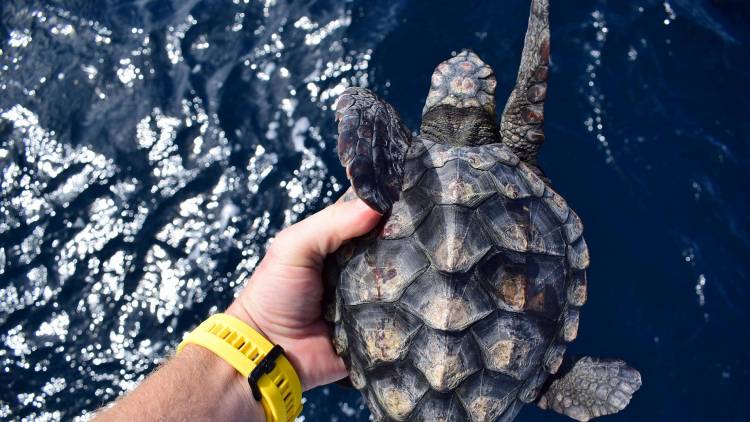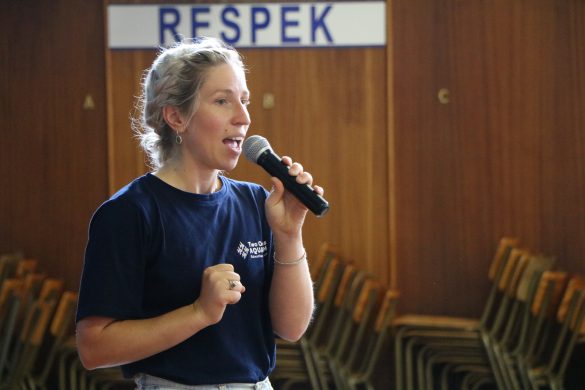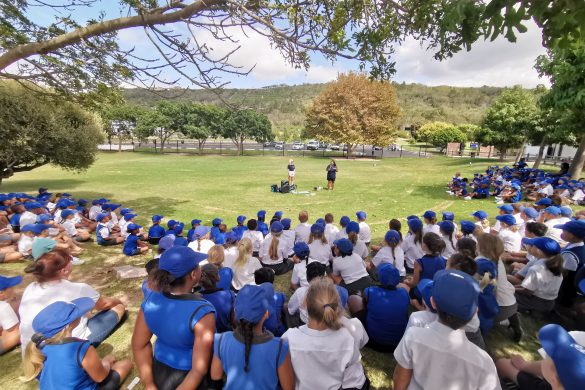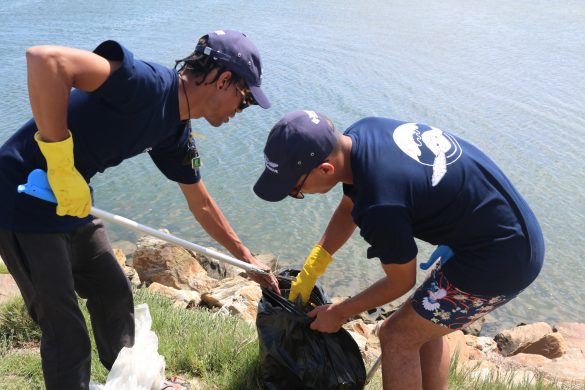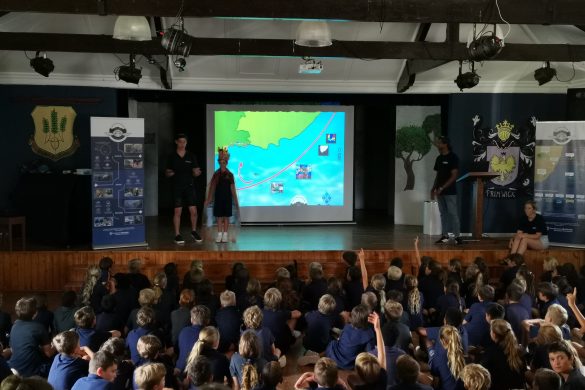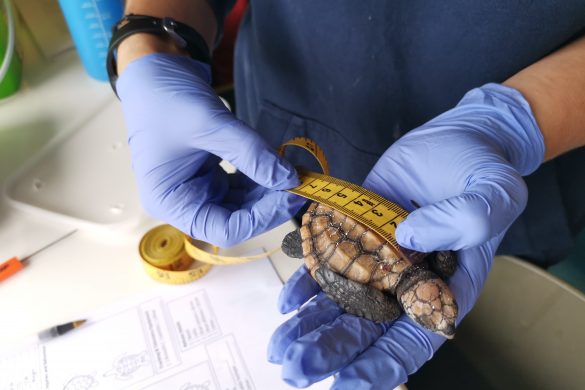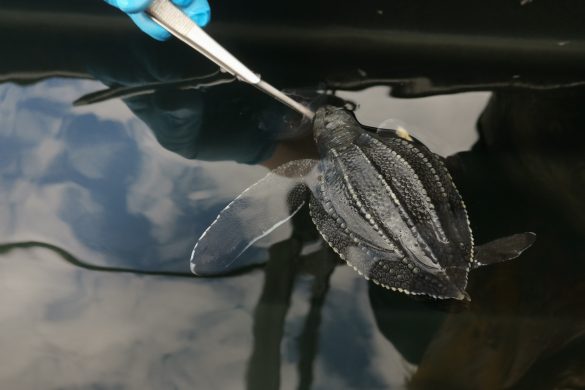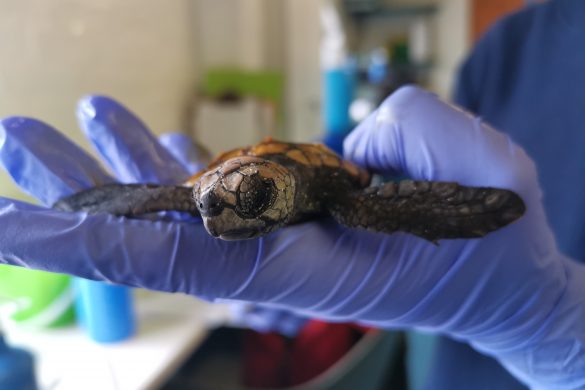This Travel Tuesday we look at the Two Ocean’s Aquarium Turtle Rescue program as they took to the road visiting schools to educate the youth on turtle rescue and conservation.
What’s it all About?
The Two Oceans Aquarium Education Foundation’s turtle rescue program exists to rescue, rehabilitate and release endangered sea turtles that become stranded or otherwise injured on the Cape coastline.
The Turtle Road Trip was led by the turtle rescue team from the Two Ocean Aquarium’s Education Foundation and were joined by foundation teachers. 9 staff members including volunteer Tracy Whitehead, who heads up the rescue network and the road trip program, took part in the road trip.
The trip was aimed at coastal communities and schools strategically located near the sea to educate them on what they need to do when they find a stranded turtle. The hope is that the children who learn how to rescue turtles will be the ones that will be on the lookout for stranded turtles when they are at the beach. In fact, only a few days after hearing the presentation at a school in Hermanus, a family walking on Arniston beach found a stranded turtle and knew exactly what to do to rescue it. This little turtle was the ninth rescue of the year, and is currently thriving at the Aquarium. This can be traced back to the family’s quick response, thanks in part to the child remembering to not put the turtle back in the water and to call for help instead.
Successful Rescues
A successful sea turtle rehabilitation story starts with someone coming across a stranded turtle. Knowledge is key when rescuing stranded turtles. This is where the Turtle Road Trip comes in.
Early in summer, loggerhead and leather back turtles nest on the beaches of northern KwaZulu-Natal. By the new year, the eggs start to hatch and the hatchlings make their way out into the big ocean. By about March these hatchlings are caught up in the warm Agulhas current and are swept down towards the Cape coastline. It is during this time that the hatchlings start to wash up on the Cape’s beaches. This phenomenon has become known as “hatchling stranding season”. The Turtle Road Trip raises awareness about “hatchling stranding season” and the steps that should be taken if a turtle is found.
By the time these turtles wash up, they are cold-stunned and dehydrated, and most of them are dealing with other forms of injury such as bites from birds or internal injury from ingested plastic. It is critical that they are transported quickly and efficiently to a rehabilitation facility at either the Two Oceans Aquarium in Cape Town, or Bayworld Aquarium in Port Elizabeth. The faster rescue arrives for a stranded hatchling, the better the odds of survival are for the little one.
Building a Community
The Turtle Rescue programme does not have the capacity to patrol every beach, or to have a driver in every coastal community to collect stranded turtles, which is why it relies on a network of committed local volunteers and partner organisations to assist with getting these turtles to the Aquarium as quickly as possible. The annual Turtle Road Trips assist in growing the size of this incredible community along the southern Cape coastline.
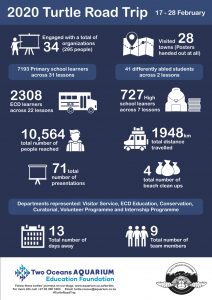 “Turtles are the most incredible teachers, ambassadors and storytellers,” says Conservation Coordinator Talitha Noble. “Today, many of us are disconnected from our environment and are unaware of the threat it faces. We have forgotten how reliant on the ocean we really are. We need to reconnect with the ocean; we need to fall in love with it again. Turtles are often the sparks that helps us reignite that connection with the sea.”
“Turtles are the most incredible teachers, ambassadors and storytellers,” says Conservation Coordinator Talitha Noble. “Today, many of us are disconnected from our environment and are unaware of the threat it faces. We have forgotten how reliant on the ocean we really are. We need to reconnect with the ocean; we need to fall in love with it again. Turtles are often the sparks that helps us reignite that connection with the sea.”
Talitha continues, “Although the 2020 Turtle Road Trip tours are over, we maintain an active working relationship with many of the people, schools and organisations we encounter. Many schools approach us with feedback, often requesting
posters to put up on their property, or for advice about starting environmental initiatives like eco-clubs and organising beach clean-ups. We also correspond with a growing number of interested people in the communities that form the backbone of the rescue network. These are often the people that will arrange transport for rescued turtles, or help care for them until a lift can be arranged. We are always eager to grow and develop relationships we’ve already established, and to form new ones.”
How you can Help
Please keep an eye out for stranded turtles when visiting the coast, especially on our southern coastline. And remember – don’t put a turtle back in the water!
If you don’t often visit the coast, or think you live too far away to help, think again: everyone has the capacity to save turtles. Almost all the rescued hatchlings we encounter have ingested plastic pollution. With the proper care, most of these hatchlings are able to excrete it, but in many cases we don’t find the plastic until it is too late; discovering it during their post-mortem examinations.
If you want to help our turtles, and all other ocean life, give some thought to your relationship with disposable, single-use plastic items such as balloons, plastic shopping bags and straws. Start with one thing and switch to a reusable. Or even better, just refuse as much single-use plastic as possible. With all the alternatives available to us, this is not difficult to do.
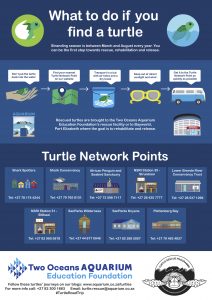
Get in touch:
Tracy Whitehead
Cell: +27 (083) 300 1663
Email: turtle.rescue@aquarium.co.za
[Travel Tuesday: Turtle Rescue Road Trip]

